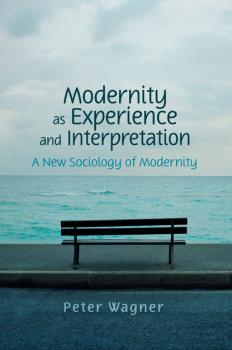Peter Wagner
Список книг автора Peter WagnerModernity as Experience and Interpretation
We are all modern today. But modernity today is not what it used to be. Over the past few decades, modernity has been radically changed by globalization, individualization, new inequalities, and fundamentalism. A novel way of analysing contemporary societies is needed. This book proposes such an analysis. Every society seeks answers to certain basic questions: how to order life in common; how to satisfy human needs; how to establish knowledge. Sociology long assumed that the answers had been found once and for all: a liberal-democratic state, a market economy, and free scientific institutions. This trinity used to be called ‘modern society’. By contrast, this book is based on the idea that, under conditions of modernity, there are no stable and certain answers to these questions. There is a plurality of possible answers, every proposed answer can be criticized and contested, and every society needs to find its answer on its own. This new sociology of modernity proposes two key instruments through which to understand the answers given to those questions: the experiences human beings have of their own modernity and the interpretations they give to those experiences. It reviews the history of ‘Western’ modernity in this light and then focuses on the specific answers that were and are being developed in Europe.
Progress
The idea of progress guided human expectations and actions for over two centuries. From the Enlightenment onwards, it was widely believed that the condition of humankind could be radically improved. History had embarked on an unstoppable forward trajectory, realizing the promise of freedom and reason. The scientific revolution, the industrial revolution, and the French Revolution, in some views also the socialist revolution, were milestones on this march of progress. But since the late twentieth century the idea of progress has largely disappeared from public debate. Sometimes it has been explicitly declared dead. The wide horizon of future possibilities has closed. The best we can hope for, some say, is to avoid regress. What happened to progress? Why did we stop believing in it, if indeed we did? This book offers answers to these questions. It reviews both the conceptual history of progress and the social and political experiences with progress over the past two centuries, and it comes to a surprising conclusion: The idea of progress was misconceived from its beginnings, and the failure of progress in practice was a result of this flawed conception. The experiences of the past half century, in turn, has allowed us to rethink progress in a more adequate way. Rather than the end of progress, they may herald the beginning of a new, reconstructed idea of progress.
The Greek Polis and the Invention of Democracy. A Politico-cultural Transformation and Its Interpretations
The Greek Polis and the Invention of Democracy presents a series of essays that trace the Greeks’ path to democracy and examine the connection between the Greek polis as a citizen state and democracy as well as the interaction between democracy and various forms of cultural expression from a comparative historical perspective and with special attention to the place of Greek democracy in political thought and debates about democracy throughout the centuries. Presents an original combination of a close synchronic and long diachronic examination of the Greek polis – city-states that gave rise to the first democratic system of government Offers a detailed study of the close interactionbetween democracy, society, and the arts in ancient Greece Places the invention of democracy in fifth-century bce Athens both in its broad social and cultural context and in the context of the re-emergence of democracy in the modern world Reveals the role Greek democracy played in the political and intellectual traditions that shaped modern democracy, and in the debates about democracy in modern social, political, and philosophical thought Written collaboratively by an international team of leading scholars in classics, ancient history, sociology, and political science
Modernity
We live in a modern age, but what does ‘modern’ mean and how can a reflection on ‘modernity’ help us to understand the world today? These are the questions that Peter Wagner sets out to answer in this concise and accessible book. Wagner begins by returning to the question of modernity's Western origins and its claims to open up a new and better era in the history of humanity. Modernity's claims and expectations have become more prevalent and widely shared, but in the course of their realization and diffusion they have also been radically transformed. In an acute and engaging analysis, Wagner examines the following key issues among others: – Modernity was based on the hope for freedom and reason, but it created the institutions of contemporary capitalism and democracy. How does the freedom of the citizen relate to the freedom of the buyer and seller today? And what does disaffection with capitalism and democracy entail for the sustainability of modernity? – Rather than a single model of modernity, there is now a plurality of forms of modern socio-political organisation. What does this entail for our idea of progress and our hope that the future world can be better than the present one? – All nuance and broadening notwithstanding, our concept of modernity is in some way inextricably tied to the history of Europe and the West. How can we compare different forms of modernity in a 'symmetric', non-biased or non-Eurocentric way? How can we develop a world-sociology of modernity?




